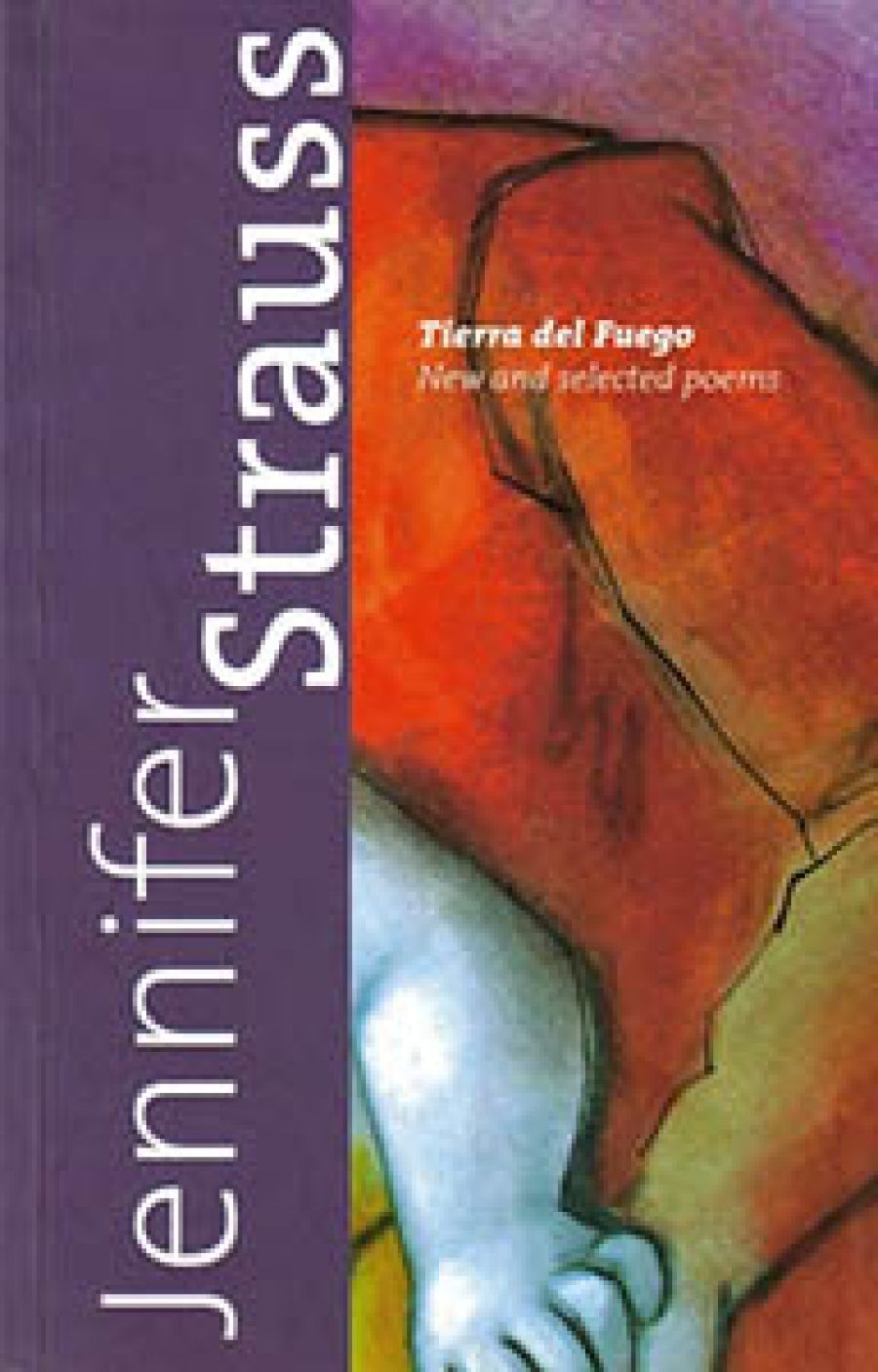
- Free Article: No
- Contents Category: Poetry
- Review Article: Yes
- Article Title: Uncanny Silence
- Online Only: No
- Custom Highlight Text:
‘Academic poet’ signifies, primarily, male academic poet. So, does the adjective ‘female’ in ‘female academic poet’ more intensely qualify ‘academic’ or ‘poet’? And what happens when that female academic poet is a teacher and student of feminist theory and women’s writing? Predictably enough, her work tempts the taboo-laden conjunction of politics and poetry.
It must be said that the poems in Tierra def Fuego, the new and selected poems of Jennifer Strauss, exhibit little anxiety about either of these issues: the role of women in academia or the threat politics might offer to the lyric, Strauss’ poetic home base. The trademarks of the academic poet have an established place in Strauss’ work: the new poem ‘Life 301 – Birthday Tutorial’, for example, picks up a theme from ‘Life 101 – Lecture’ from her first collection, Children and Other Strangers, of 1975, using the classroom as a metaphor for other kinds of learning.
- Book 1 Title: Tierra del Fuego
- Book 1 Subtitle: New and selected poems
- Book 1 Biblio: Pariah Press, $14pb, 100 pp
Following good classical precepts – Strauss is also a medievalist – her poetry both teaches and delights, though what it teaches is of course far from what the classical and medieval theorists had in mind. Feminist politics are actively ‘taught’ in many of these poems, and this is the clearest indication of Strauss’ academic background: the irresistible desire not just to show, but to explain. This is not to say her touch is heavyhanded (such vocabulary buys too readily into an inappropriate Romantic ethos); rather, to observe that the poems themselves often seem preoccupied with explaining, naming, and teaching – with diegesis. In this regard, Strauss affiliates herself firmly with second-wave feminism and with the twentieth-century traditions of women’s poetry – both traditions of naming (experiences, body parts, emotions) and of appropriating language as an active force for reform.
The Adrienne Rich-inspired odes to Anne Sexton, and to Mary Wollstonecraft and Mary Shelley, for example, sit neatly with the feminist projects of acknowledging the lives of women of the past, and of naming our mothers and foremothers in intellectual or writerly achievement. This is itself a kind of teaching. Nor can Strauss resist the teacherly impulse to correct the (student’s?) customary identification of ‘Frankenstein’ with the monster: of course he is the creator. Another poem, ‘Medusa’, successfully gives a classical myth a ‘classic’ feminist make-over, into the modern story of a betrayed wife: ‘Eye contact is not a problem/for this corporate wife of a certain age’.
Sometimes it is less the structural design of poems but the imagery itself that does this work of naming, of establishing a place for women’s bodies and women’s lives in the lyric poem. In ‘The Melancholic at the Dinner Party’, the woman’s ‘sadness’ (Strauss is perhaps too ready to label the emotion) is described as ‘a menstrual pain/that will not bleed away.’ The work of naming, in a way that might make a difference, seems endless: when will this necessity be resolved?
One poem that appears early in the collection, ‘Discourse in Eden’, comes closest to grappling with this issue of how to name and teach, and when not to do it, though I’m not sure, how much of this is conscious. In this poem, Adam struggles with his important task of naming all the animals (‘so many different names’), but his confusion is compounded when, the day after being named, the giraffe has wandered from his direct view.
And though the sky’s still blue,
the leaves densely green,
there is a blank,
a space within creation –
inscribed giraffe, it signifies
the other, absence, lack.
What an invitation to re-read this primal scene through feminist psychoanalysis, as Eve suddenly feels herself ‘hollow … bespoken’. If the critical vocabulary is already there in the poem, and if we have already been told what this moment signifies …
But perhaps this is Eve’s work with language, not to bestow names in that original, Edenic moment; but to be destined repeatedly to name and re-name, endlessly to remind us about the experiences of women, and women’s language.
Sometimes the academic world is brought in more obviously in a spirit of play. From ‘In the Bistro: University House, Canberra’, after reference to Christ and Lear:
Where is Mary? Where’s Cordelia?
Outside this text. Which
is where I ought to take myself,
instead of drinking
a defiant bottle of red …
The Derridean bad penny (il n’y a pas hors de texte) turns up only to get thoroughly sozzled in the staff club.
Of course it’s impossible to sum up over twenty years of poetry in such a short space: I’ve been preoccupied with Strauss’s more recent poems because they seem to raise such urgent questions for women’s poetry at the present time. I’ve not mentioned that familiar, elegant elegiac strain in Strauss’s poetry, or her fascination with cultural alterity, especially in the strong title sequence. Finally, this moment of uncanny silence:
(each night
in this foreign land
the familiar dead
walk in my dreams
absorbed in conversation –
the homely words
flow over, round like cool water
but still I’m parched,
they do not speak with me –
what does this mean?)


Comments powered by CComment